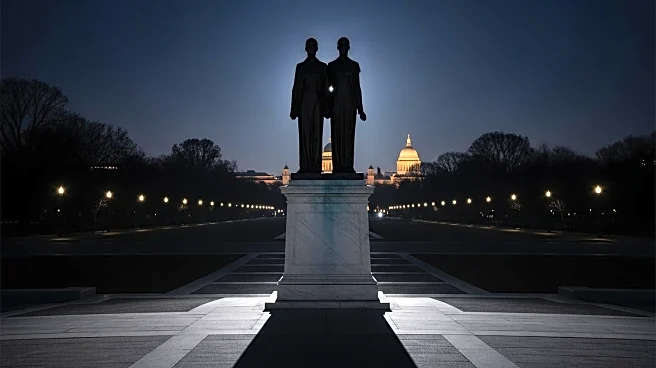What is the story about?
What's Happening?
A controversial statue depicting President Donald Trump and the late financier Jeffrey Epstein has reappeared on the National Mall in Washington, D.C. The statue, titled 'Best Friends Forever,' shows the two figures holding hands and was initially installed last week before being removed by U.S. Park Police on September 24. The reinstallation coincides with a government shutdown, which has left the National Park Service unable to comment. The statue includes a plaque celebrating the 'long-standing bond' between Trump and Epstein. White House deputy press secretary Abigail Jackson dismissed the installation, emphasizing that President Trump had distanced himself from Epstein, whom he had previously known. The group 'The Secret Handshake' has claimed responsibility for the statue.
Why It's Important?
The reappearance of the statue highlights ongoing public interest and controversy surrounding President Trump's past association with Jeffrey Epstein, a convicted sex offender. This installation serves as a critique of Trump's historical ties with Epstein, despite Trump's efforts to distance himself from the financier. The statue's presence during a government shutdown underscores the challenges in managing public spaces and the expression of political art. The situation also reflects broader tensions in U.S. politics, where symbolic acts are used to comment on political figures and their past associations. The event may influence public perception of Trump's legacy and the handling of Epstein-related investigations.
What's Next?
The reinstallation of the statue may prompt further actions from political groups and artists seeking to make statements about President Trump and his administration. It could also lead to increased scrutiny of public art installations and their regulation, especially in politically sensitive contexts. The ongoing government shutdown may delay any official response or removal of the statue, potentially allowing it to remain a focal point for public discourse. Additionally, the House Oversight Committee's interest in Epstein-related documents may continue to fuel discussions about transparency and accountability in government dealings with controversial figures.
Beyond the Headlines
The statue's presence raises questions about the role of public art in political discourse and the ethical implications of using art to critique public figures. It also highlights the cultural impact of Epstein's case and its enduring influence on American society. The installation may provoke discussions about the boundaries of artistic expression and the responsibilities of artists in addressing sensitive historical and political issues. Furthermore, it reflects the ongoing struggle to reconcile public figures' past actions with their current reputations, a theme that resonates in broader societal debates about accountability and redemption.















